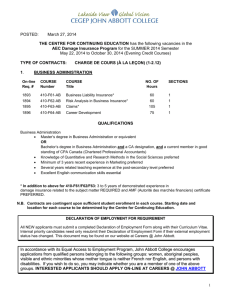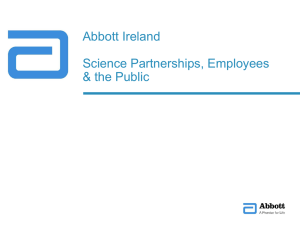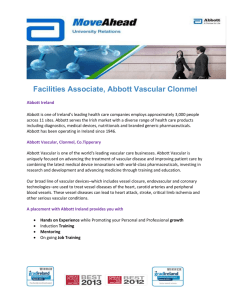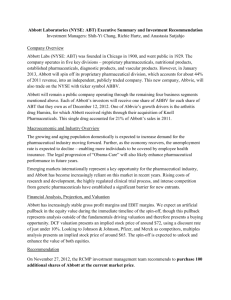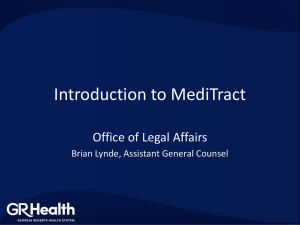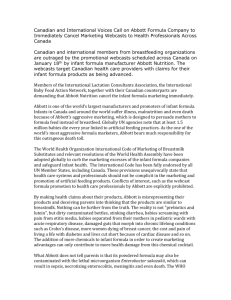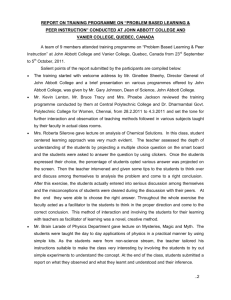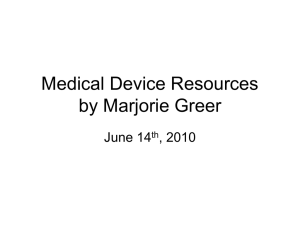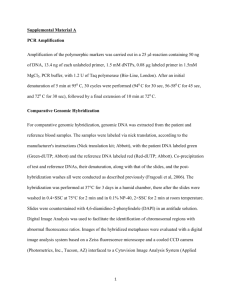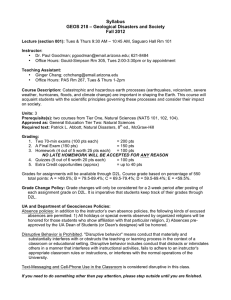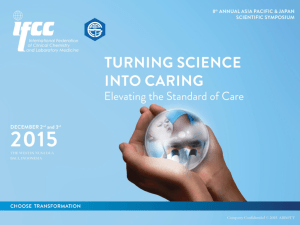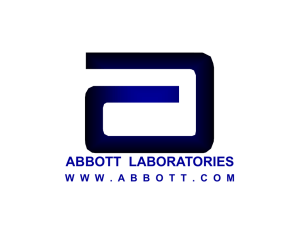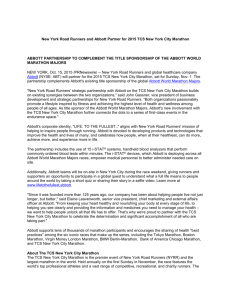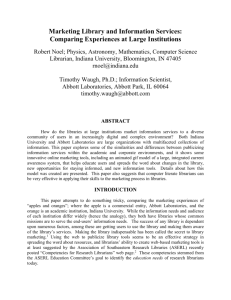Business Management - John Birchall
advertisement
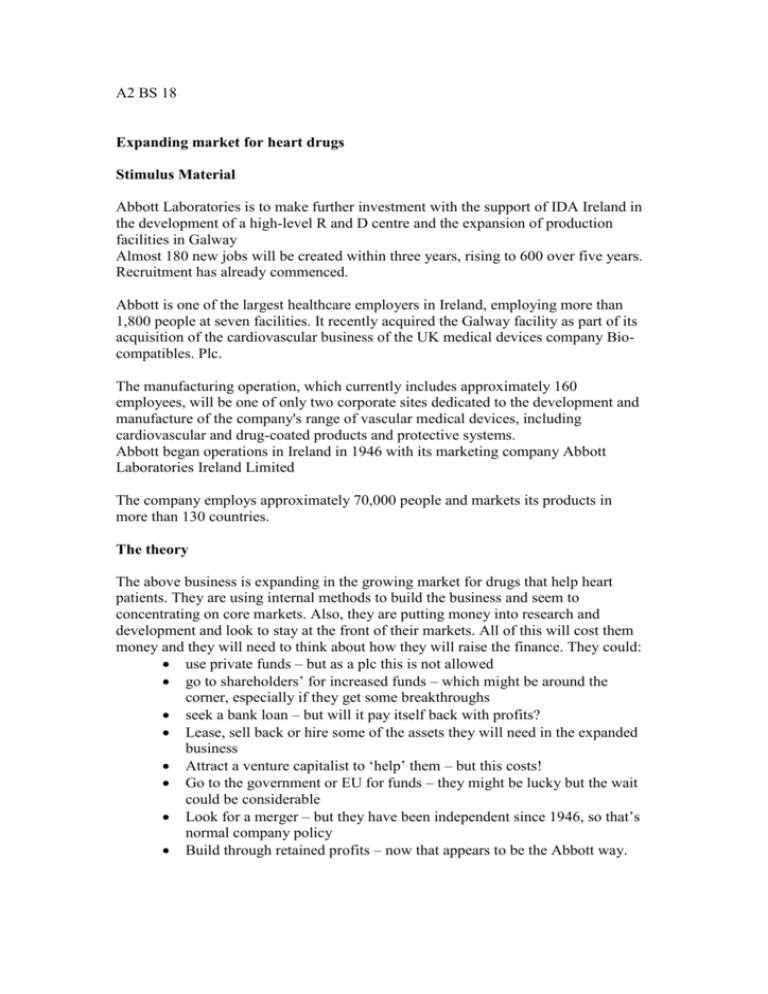
A2 BS 18 Expanding market for heart drugs Stimulus Material Abbott Laboratories is to make further investment with the support of IDA Ireland in the development of a high-level R and D centre and the expansion of production facilities in Galway Almost 180 new jobs will be created within three years, rising to 600 over five years. Recruitment has already commenced. Abbott is one of the largest healthcare employers in Ireland, employing more than 1,800 people at seven facilities. It recently acquired the Galway facility as part of its acquisition of the cardiovascular business of the UK medical devices company Biocompatibles. Plc. The manufacturing operation, which currently includes approximately 160 employees, will be one of only two corporate sites dedicated to the development and manufacture of the company's range of vascular medical devices, including cardiovascular and drug-coated products and protective systems. Abbott began operations in Ireland in 1946 with its marketing company Abbott Laboratories Ireland Limited The company employs approximately 70,000 people and markets its products in more than 130 countries. The theory The above business is expanding in the growing market for drugs that help heart patients. They are using internal methods to build the business and seem to concentrating on core markets. Also, they are putting money into research and development and look to stay at the front of their markets. All of this will cost them money and they will need to think about how they will raise the finance. They could: use private funds – but as a plc this is not allowed go to shareholders’ for increased funds – which might be around the corner, especially if they get some breakthroughs seek a bank loan – but will it pay itself back with profits? Lease, sell back or hire some of the assets they will need in the expanded business Attract a venture capitalist to ‘help’ them – but this costs! Go to the government or EU for funds – they might be lucky but the wait could be considerable Look for a merger – but they have been independent since 1946, so that’s normal company policy Build through retained profits – now that appears to be the Abbott way. Topic of the Week Getting bigger – some bridges to cross As a business gets bigger it faces increased problems with planning. It wants to gain maximum economies of scale but without careful planning and co-ordination it might only get diseconomies of scale. So, what will it have to keep a close eye on? market research – as a firm grows so it risks losing contact with its core audience. They will need to make certain that the ‘keep in touch’. Distribution – again growth poses problems for getting the product to the customer. Costs will rise and so efficiency must increase accordingly. Perhaps they might distribute themselves, or sub-contract to specialists? Marketing – again budgets will probably rise and effectiveness will need checking. Branding will become even more important and reputation and trust will be major parts of the business. Targets – the markets will become more geographically spread and the pressures of international marketing will become part of the business. Production methods – these will need to be analysed. Mass production will be used but perhaps cell production and the use of teams might be worth considering? Relocation – should we stay where we are, or look elsewhere. In the case of Abbott Ireland is a fast growing economy and is within the EU – so they will probably stay where they are. Re-organisation – the structure of the firm might require some alterations. Will a flatter and leaner company emerge post any expansion? Buying – this will take more and more cash, so decisions will have to correct and delivery ‘just in time. Managing people – the numbers will rise and so will the need for careful HRM policies. Will more delegation and empowerment be used? How will they keep employees motivated as the business gets larger? Just some of the problems faced by management as a business expands. Some questions 1. Explain what the terms (a) core business (b) cell production and (c) empowerment mean. 2. In what ways could Abbott have built their business? 3. What problems might Abbott face as it expands? 4. How might Abbott expand even more as a business? Suggested Answers 1 (a) those activities of the business in which it feels that it has experience, competence and probably a high market standing (b) a method of production in which manufacturing process is organised into independent teams 9 or cells) each of which produces a group or family of products. (c) Giving workers more control over their working lives. 2. Abbott could have expanded internally by making larger profits and retaining a proportion of these. These in turn could have been used for research, new product development and concentrating on building markets. Through sales growth the company would have generated money and this could have been used to buy assets and secure further market domination. In contrast they could have merged with others at the same stage of production, so forming a horizontal integration of businesses or moved forwards on the production process, so securing more control over their retail operations. They could have gone down the vertical integration route and acquired suppliers of raw materials. Both moves would have kept all revenues and profits within the parent group. 3. It could begin to experience problems with control and communication within the business. These are part of what are known as diseconomies of scale. Such problems are mainly people based. It becomes more difficult to keep average costs falling as problems with managing a business of considerable size increase. Management fail to see problems arising and communication systems sometimes do not take not of difficulties. People do not know to whom to report. Motivation might fall and staff turnover increase. If costs do rise then competitiveness will fall. Sales might struggle and outsiders might think of you as worth a take-over bid. So, size does not necessarily equal success. 4.They already operate in 130 countries, so globalisation has already arrived. They might be able to look at: licensing franchising sharing patents or they might look to see where they could use their core competence to diversify into related markets. This might allow them to enter joint ventures or even making drugs under licence for someone else. They appear to have the expertise, reputation and capacity to continue to grow.

